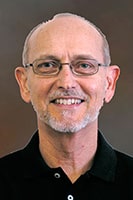
(WW) — Does American consumerism have any limits or is its impact infinite? As we recover from the assault of holiday advertising and take stock of our own spending habits, we may wonder.

Doyle Sager
This is the time of year when we ask tough questions about our relationship to possessions. Where did our money go and what was it for? In other words, did all that consuming add meaning and value to our lives? Economist John Kenneth Galbraith’s words should give us pause: “The danger of our current market economy is not so much that it responds to existing needs as it creates the wants which those goods presume to satisfy.”
Confronted with the crass materialism of our times, people of faith often assume a superior attitude, as if the unchurched are the only ones who have their priorities all mixed up. But are we, the followers of Jesus, any less enslaved? Does the Good News really liberate us? Do the teachings and example of Jesus make any difference in the way we view possessions and money? John Haughey observed, “We read the Gospel as if we had no money and we spend our money as if we know nothing of the Gospel” (quoted in How Much Is Enough? by Arthur Simon, p. 178).
In Luke 12:16-21, Jesus told a simple yet powerful story about a prosperous farmer. After enjoying a bumper crop, the man decided to tear down his barns and build bigger ones. But God called the man a fool. Why not share his wealth with his hungry neighbors, filling stomachs instead of grain bins? Did the farmer have a need to impress others? Do we? The rich man is almost cartoon-like in his excess. We laugh at his pretension — and our own.
The liberating power of God’s Good News, particularly showcased in Luke’s Gospel, is desperately needed today. It reminds us that consuming goods will never satisfy our souls. We often think of the Gospel of Luke as having important words for the down-and-out; it has just as much to say to the up-and-out. The message is clear: God’s love liberates us from the tyranny of more.
Like the rich man in Jesus’ parable, we make three mistakes. 1. We assume more is better; 2. We assume bigger is better; 3. We assume things will bring us security.

At Christmas and birthday celebrations, we could focus on the gift of our presence, not our presents. Image by Jill Wellington from Pixabay
But possessions often leave us more anxious (think electronic passwords, padlocks, security systems, gated communities). Years ago, someone observed Mother Teresa on an all-night bus ride. While others clutched their handbags as they tried to rest, Mother Teresa slept soundly. A rumpled sack near her contained most of her earthly possessions.
Many years ago, the congregation I pastored organized a pie festival on a Sunday evening. Everyone brought their favorite pie and, of course, expected me to sample theirs. The discovery I made that evening has profound implications for a culture awash in excess: At some point, chocolate, lemon meringue, peach, and pecan pies all start tasting alike. That’s what economists call the law of diminishing return — the more we have of something, the less we enjoy it.
In a recent essay in Time magazine, Anand Giridharadas declares, “The choice facing Americans is whether we want to be a society organized around money’s thirsts…” He suggests that perhaps we can give ourselves to more noble and lasting pursuits. When money is not the be-all and end-all of our existence, we are set free to experience personal and cultural renewal, building our common life on something more substantial than a stock portfolio.
Our counter-cultural protest against the false god More could begin in small ways. We could take an honest look at our spending in 2019. What stands out? What is missing?
We could have a conversation with our loved ones about the difference between wants and needs (good luck with that one). At Christmas and birthday celebrations, we could focus on the gift of our presence, not our presents. Relationships, deep listening, storytelling, and laughter — these are our best gifts to each other. And they are free.
